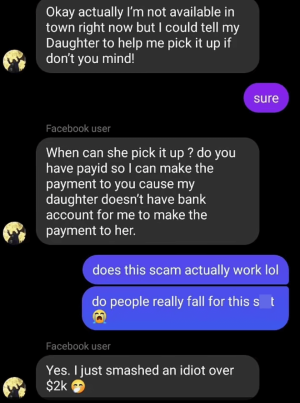You won't believe what this scammer confessed when confronted by a savvy Aussie!
- Replies 10
Online scams have become a scourge of our times. As we grow increasingly dependent on internet services and digital platforms, online fraudsters are seizing the opportunities for illicit gain. But consider this: what happens when the tables turn on these crafty schemers?
In a unique and surprising turn of events, an Aussie gave us a hint. They not only exposed an ongoing scam but wrangled a shocking confession out of the scammer.
But first, who are these scammers? What do we actually know about who is behind the deception?
According to cybersecurity experts, a typical online scammer often covers their tracks very effectively. They can be anyone, anywhere in the world—from teenagers operating out of their bedrooms to organised criminal groups.
The key is—they thrive on anonymity. The strategic play is generally to earn your trust by building a plausible backstory.
Such was the case for one scammer, who thought they were closing in on a victim. A poster shared on Reddit how criminals have resorted to posing as legitimate buyers on platforms like Facebook Marketplace to trick online sellers out of their money. The poster shared a screenshot of a conversation as an example.
'Actually, I'm not available in town right now but I could tell my Daughter to help me pick it up if you don't mind!' the scammer wrote.
The conman (or woman) then attempts to secure bank details under the guise of arranging payment—a classic scam strategy.
After a short reply of ‘sure’ from the seller, the fake buyer replied: ‘Do you have payid (payment identification) so I can make payment to you cause my daughter doesn't have bank account for me to make payment to her.'
'Does this scam actually work lol,' the seller responded, taking the scammer head on.
'Do people really fall for this s***,' he continued, following it with a crying emoji.
Surprisingly, the swindler confessed, 'Yes. I just smashed an i***t over $2k.’
‘The post garnered a bunch of responses, with several users sharing their insights.
‘Many scams are done by 14-16 year old Aussie kids', said one commenter.
‘You'd be surprised how many sit on hacking forums determining how to scam the Aussie public.'
Anotheragreed: 'Yeah the wording of that reply doesn't scream Nigerian prince to me, it screams bogan.’
But the truth remains elusive.

Remember, if you suspect something fishy, report it immediately to the Australian Security Intelligence Organisation (ASIO) or ScamWatch. We can hopefully prompt hard-hitting platforms like Facebook to pull up their socks and enforce stricter security measures.
In the meantime, hone your scam-dodging skills with these tips:
- STOP: If you're in doubt, withhold your money and personal details. Scammers are exceptional actors, don't fall for the performance.
- THINK: Make it a habit to question the authenticity of the message or call received. Your best bet is to contact businesses directly on their official website or through secure apps.
- PROTECT: Trust your gut feeling. If something appears off, take immediate action.
By pooling our information and staying on guard, we can help each other avoid these deceptions. You can find the latest posts and information on our very own Scam Watch forum here.
Stay cyber-safe, members!
In a unique and surprising turn of events, an Aussie gave us a hint. They not only exposed an ongoing scam but wrangled a shocking confession out of the scammer.
But first, who are these scammers? What do we actually know about who is behind the deception?
According to cybersecurity experts, a typical online scammer often covers their tracks very effectively. They can be anyone, anywhere in the world—from teenagers operating out of their bedrooms to organised criminal groups.
The key is—they thrive on anonymity. The strategic play is generally to earn your trust by building a plausible backstory.
Such was the case for one scammer, who thought they were closing in on a victim. A poster shared on Reddit how criminals have resorted to posing as legitimate buyers on platforms like Facebook Marketplace to trick online sellers out of their money. The poster shared a screenshot of a conversation as an example.
'Actually, I'm not available in town right now but I could tell my Daughter to help me pick it up if you don't mind!' the scammer wrote.
The conman (or woman) then attempts to secure bank details under the guise of arranging payment—a classic scam strategy.
After a short reply of ‘sure’ from the seller, the fake buyer replied: ‘Do you have payid (payment identification) so I can make payment to you cause my daughter doesn't have bank account for me to make payment to her.'
'Does this scam actually work lol,' the seller responded, taking the scammer head on.
'Do people really fall for this s***,' he continued, following it with a crying emoji.
Surprisingly, the swindler confessed, 'Yes. I just smashed an i***t over $2k.’
‘The post garnered a bunch of responses, with several users sharing their insights.
‘Many scams are done by 14-16 year old Aussie kids', said one commenter.
‘You'd be surprised how many sit on hacking forums determining how to scam the Aussie public.'
Anotheragreed: 'Yeah the wording of that reply doesn't scream Nigerian prince to me, it screams bogan.’
But the truth remains elusive.
Key Takeaways
- An online scammer admitted to successfully swindling over $2k from a fraud victim in Australia.
- The scam involved the fraudster pretending to transfer money to a seller and then asking for an 'account upgrade fee' to release the funds.
- The scammer responded frankly when the targeted individual questioned the legitimacy of the transaction.
- Netizens suggested that such scams could originate from various sources, including overseas or from young Australian hackers. They advised victims or targeted individuals to report scams to the Australian Security Intelligence Organisation (ASIO).
Remember, if you suspect something fishy, report it immediately to the Australian Security Intelligence Organisation (ASIO) or ScamWatch. We can hopefully prompt hard-hitting platforms like Facebook to pull up their socks and enforce stricter security measures.
In the meantime, hone your scam-dodging skills with these tips:
- STOP: If you're in doubt, withhold your money and personal details. Scammers are exceptional actors, don't fall for the performance.
- THINK: Make it a habit to question the authenticity of the message or call received. Your best bet is to contact businesses directly on their official website or through secure apps.
- PROTECT: Trust your gut feeling. If something appears off, take immediate action.
By pooling our information and staying on guard, we can help each other avoid these deceptions. You can find the latest posts and information on our very own Scam Watch forum here.
Stay cyber-safe, members!









